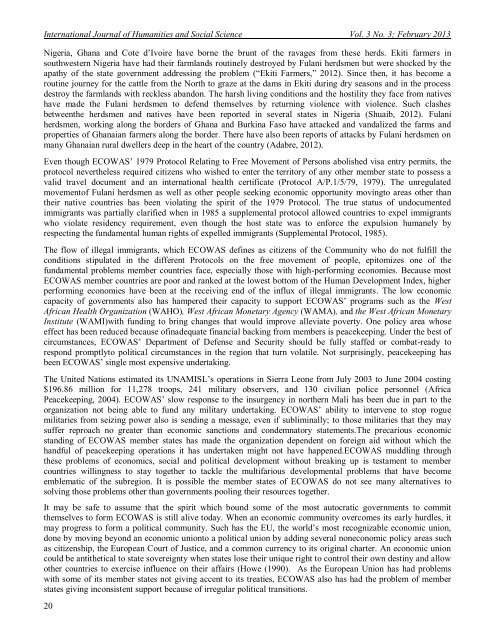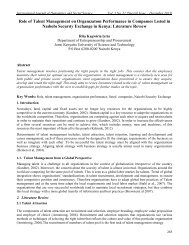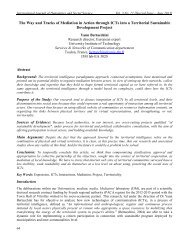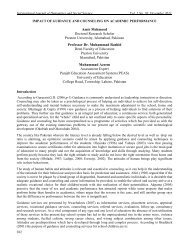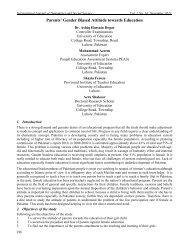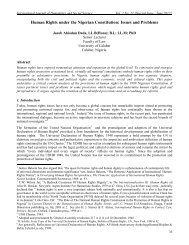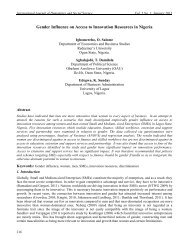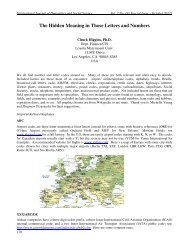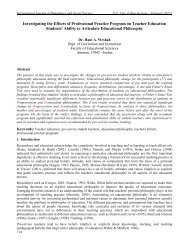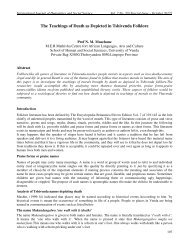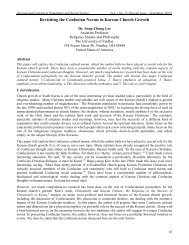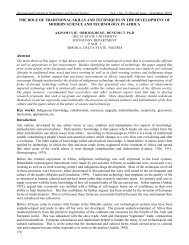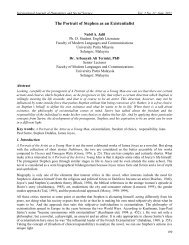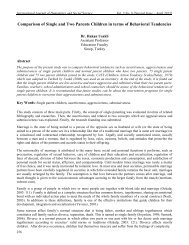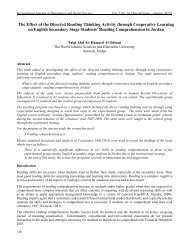The Political and Security Challenges Facing 'ECOWAS' in the ...
The Political and Security Challenges Facing 'ECOWAS' in the ...
The Political and Security Challenges Facing 'ECOWAS' in the ...
Create successful ePaper yourself
Turn your PDF publications into a flip-book with our unique Google optimized e-Paper software.
International Journal of Humanities <strong>and</strong> Social Science Vol. 3 No. 3; February 2013<br />
Nigeria, Ghana <strong>and</strong> Cote d‟Ivoire have borne <strong>the</strong> brunt of <strong>the</strong> ravages from <strong>the</strong>se herds. Ekiti farmers <strong>in</strong><br />
southwestern Nigeria have had <strong>the</strong>ir farml<strong>and</strong>s rout<strong>in</strong>ely destroyed by Fulani herdsmen but were shocked by <strong>the</strong><br />
apathy of <strong>the</strong> state government address<strong>in</strong>g <strong>the</strong> problem (“Ekiti Farmers,” 2012). S<strong>in</strong>ce <strong>the</strong>n, it has become a<br />
rout<strong>in</strong>e journey for <strong>the</strong> cattle from <strong>the</strong> North to graze at <strong>the</strong> dams <strong>in</strong> Ekiti dur<strong>in</strong>g dry seasons <strong>and</strong> <strong>in</strong> <strong>the</strong> process<br />
destroy <strong>the</strong> farml<strong>and</strong>s with reckless ab<strong>and</strong>on. <strong>The</strong> harsh liv<strong>in</strong>g conditions <strong>and</strong> <strong>the</strong> hostility <strong>the</strong>y face from natives<br />
have made <strong>the</strong> Fulani herdsmen to defend <strong>the</strong>mselves by return<strong>in</strong>g violence with violence. Such clashes<br />
between<strong>the</strong> herdsmen <strong>and</strong> natives have been reported <strong>in</strong> several states <strong>in</strong> Nigeria (Shuaib, 2012). Fulani<br />
herdsmen, work<strong>in</strong>g along <strong>the</strong> borders of Ghana <strong>and</strong> Burk<strong>in</strong>a Faso have attacked <strong>and</strong> v<strong>and</strong>alized <strong>the</strong> farms <strong>and</strong><br />
properties of Ghanaian farmers along <strong>the</strong> border. <strong>The</strong>re have also been reports of attacks by Fulani herdsmen on<br />
many Ghanaian rural dwellers deep <strong>in</strong> <strong>the</strong> heart of <strong>the</strong> country (Adabre, 2012).<br />
Even though ECOWAS‟ 1979 Protocol Relat<strong>in</strong>g to Free Movement of Persons abolished visa entry permits, <strong>the</strong><br />
protocol never<strong>the</strong>less required citizens who wished to enter <strong>the</strong> territory of any o<strong>the</strong>r member state to possess a<br />
valid travel document <strong>and</strong> an <strong>in</strong>ternational health certificate (Protocol A/P.1/5/79, 1979). <strong>The</strong> unregulated<br />
movementof Fulani herdsmen as well as o<strong>the</strong>r people seek<strong>in</strong>g economic opportunity mov<strong>in</strong>gto areas o<strong>the</strong>r than<br />
<strong>the</strong>ir native countries has been violat<strong>in</strong>g <strong>the</strong> spirit of <strong>the</strong> 1979 Protocol. <strong>The</strong> true status of undocumented<br />
immigrants was partially clarified when <strong>in</strong> 1985 a supplemental protocol allowed countries to expel immigrants<br />
who violate residency requirement, even though <strong>the</strong> host state was to enforce <strong>the</strong> expulsion humanely by<br />
respect<strong>in</strong>g <strong>the</strong> fundamental human rights of expelled immigrants (Supplemental Protocol, 1985).<br />
<strong>The</strong> flow of illegal immigrants, which ECOWAS def<strong>in</strong>es as citizens of <strong>the</strong> Community who do not fulfill <strong>the</strong><br />
conditions stipulated <strong>in</strong> <strong>the</strong> different Protocols on <strong>the</strong> free movement of people, epitomizes one of <strong>the</strong><br />
fundamental problems member countries face, especially those with high-perform<strong>in</strong>g economies. Because most<br />
ECOWAS member countries are poor <strong>and</strong> ranked at <strong>the</strong> lowest bottom of <strong>the</strong> Human Development Index, higher<br />
perform<strong>in</strong>g economies have been at <strong>the</strong> receiv<strong>in</strong>g end of <strong>the</strong> <strong>in</strong>flux of illegal immigrants. <strong>The</strong> low economic<br />
capacity of governments also has hampered <strong>the</strong>ir capacity to support ECOWAS‟ programs such as <strong>the</strong> West<br />
African Health Organization (WAHO), West African Monetary Agency (WAMA), <strong>and</strong> <strong>the</strong> West African Monetary<br />
Institute (WAMI)with fund<strong>in</strong>g to br<strong>in</strong>g changes that would improve alleviate poverty. One policy area whose<br />
effect has been reduced because of<strong>in</strong>adequate f<strong>in</strong>ancial back<strong>in</strong>g from members is peacekeep<strong>in</strong>g. Under <strong>the</strong> best of<br />
circumstances, ECOWAS‟ Department of Defense <strong>and</strong> <strong>Security</strong> should be fully staffed or combat-ready to<br />
respond promptlyto political circumstances <strong>in</strong> <strong>the</strong> region that turn volatile. Not surpris<strong>in</strong>gly, peacekeep<strong>in</strong>g has<br />
been ECOWAS‟ s<strong>in</strong>gle most expensive undertak<strong>in</strong>g.<br />
<strong>The</strong> United Nations estimated its UNAMISL‟s operations <strong>in</strong> Sierra Leone from July 2003 to June 2004 cost<strong>in</strong>g<br />
$196.86 million for 11,278 troops, 241 military observers, <strong>and</strong> 130 civilian police personnel (Africa<br />
Peacekeep<strong>in</strong>g, 2004). ECOWAS‟ slow response to <strong>the</strong> <strong>in</strong>surgency <strong>in</strong> nor<strong>the</strong>rn Mali has been due <strong>in</strong> part to <strong>the</strong><br />
organization not be<strong>in</strong>g able to fund any military undertak<strong>in</strong>g. ECOWAS‟ ability to <strong>in</strong>tervene to stop rogue<br />
militaries from seiz<strong>in</strong>g power also is send<strong>in</strong>g a message, even if sublim<strong>in</strong>ally; to those militaries that <strong>the</strong>y may<br />
suffer reproach no greater than economic sanctions <strong>and</strong> condemnatory statements.<strong>The</strong> precarious economic<br />
st<strong>and</strong><strong>in</strong>g of ECOWAS member states has made <strong>the</strong> organization dependent on foreign aid without which <strong>the</strong><br />
h<strong>and</strong>ful of peacekeep<strong>in</strong>g operations it has undertaken might not have happened.ECOWAS muddl<strong>in</strong>g through<br />
<strong>the</strong>se problems of economics, social <strong>and</strong> political development without break<strong>in</strong>g up is testament to member<br />
countries will<strong>in</strong>gness to stay toge<strong>the</strong>r to tackle <strong>the</strong> multifarious developmental problems that have become<br />
emblematic of <strong>the</strong> subregion. It is possible <strong>the</strong> member states of ECOWAS do not see many alternatives to<br />
solv<strong>in</strong>g those problems o<strong>the</strong>r than governments pool<strong>in</strong>g <strong>the</strong>ir resources toge<strong>the</strong>r.<br />
It may be safe to assume that <strong>the</strong> spirit which bound some of <strong>the</strong> most autocratic governments to commit<br />
<strong>the</strong>mselves to form ECOWAS is still alive today. When an economic community overcomes its early hurdles, it<br />
may progress to form a political community. Such has <strong>the</strong> EU, <strong>the</strong> world‟s most recognizable economic union,<br />
done by mov<strong>in</strong>g beyond an economic unionto a political union by add<strong>in</strong>g several noneconomic policy areas such<br />
as citizenship, <strong>the</strong> European Court of Justice, <strong>and</strong> a common currency to its orig<strong>in</strong>al charter. An economic union<br />
could be anti<strong>the</strong>tical to state sovereignty when states lose <strong>the</strong>ir unique right to control <strong>the</strong>ir own dest<strong>in</strong>y <strong>and</strong> allow<br />
o<strong>the</strong>r countries to exercise <strong>in</strong>fluence on <strong>the</strong>ir affairs (Howe (1990). As <strong>the</strong> European Union has had problems<br />
with some of its member states not giv<strong>in</strong>g accent to its treaties, ECOWAS also has had <strong>the</strong> problem of member<br />
states giv<strong>in</strong>g <strong>in</strong>consistent support because of irregular political transitions.<br />
20


